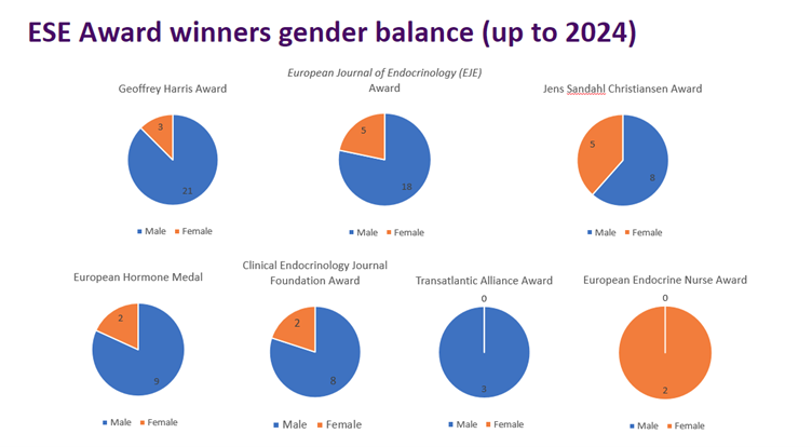Gender Equality in ESE
Gender equality within ESE’s structures was part of Martin Reincke’s (previous ESE President 2022-2023) focus on diversity, together with other areas; including age/career stage, and country size and geographical location. This continues to be a top priority for ESE, and all four diversity measures are reviewed during all nomination procedures, and ESE has a clear statement on equality, diversity and inclusion.
Before the EUWIN community was launched, we undertook research as well as gathering Members’ views via ESE’s 2022 Membership survey and collating ideas from the EUWIN launch event. We are pleased to share our research findings with you below.
Research findings on gender analysis and Members' priorities (2022)
In an article in Endocrine Views by Joy Y Wu, she highlighted the ongoing gender disparity in medicine which while it appears to be well-recognised, is seemingly slow to resolve. The data she discusses which are mainly from the USA, show that the numbers of female professors, department chairs and medical school deans are still substantially lower than men. She states that promotions in academic medicine are typically tied to metrics of recognition, yet women receive fewer speaking invitations, endowed Chairs, society leadership positions and society awards. Women are held to higher standards for promotion than men and are also paid less than men. The pandemic has also hindered progress towards gender equity in endocrinology. Read the full article on page 11 of Endocrine Views Issue 48 (Summer 2022).
ESE has carried out some analysis on gender within ESE’s Committees and Membership:
47% of ESE’s members are female, 37% are male and 16% are undisclosed as of end June 2022.
There is increasing representation of women across ESE Committees and Boards and a commitment to growing this through various governance policies, including all Committee nominations now being reviewed by the Nominations Committee to gender diversity (as well as age/career stage, country location and size). As at May 2022 35% of Committee positions are female and 65% male.
On ESE's Executive Committee, 5 out of 13 (40%) are female, including Ex-Officio as at December 2023.
Historically a higher proportion of ESE grants were awarded to women than men in 2017-2021. In 2021 women received 361 ESE grants (vs 130 to men and 105 undisclosed gender).
There is still work to be done on ESE’s Awards where data showed that between 2011 and 2022, of the 188 Award Nominations received, 33 were females (18%). The winners, however, represented 25% female and 75% male. The 2026 ESE Awards are now open (deadline is 28 February 2025) – please nominate a colleague, friend or yourself and encourage other women to nominate too.

Following the launch of the EUWIN initiative at ECE 2022 in May 2022, we have gathered feedback from three sources:
- From members via a member survey
- From delegates who attended the EUWIN launch event at ECE 2022
- From delegates who completed the ECE 2022 survey post event
We asked the Membership for comment on support needs for women across the field of endocrinology in the April 2022 membership survey.
The top three areas which the ESE Membership thought women could benefit from support were:
- To apply for leadership positions on committees, working groups, taskforces, boards etc. within medical societies/associations (not specifically ESE)
- Support for career re-entry following family and career
- Mentorship
These are areas where we are currently focusing our EUWIN support activities.